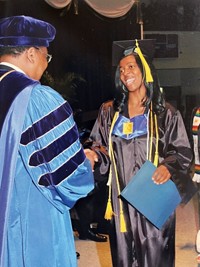Advertisement
Grab your lab coat. Let's get started
Welcome!
Welcome!
Create an account below to get 6 C&EN articles per month, receive newsletters and more - all free.
It seems this is your first time logging in online. Please enter the following information to continue.
As an ACS member you automatically get access to this site. All we need is few more details to create your reading experience.
Not you? Sign in with a different account.
Not you? Sign in with a different account.
ERROR 1
ERROR 1
ERROR 2
ERROR 2
ERROR 2
ERROR 2
ERROR 2
Password and Confirm password must match.
If you have an ACS member number, please enter it here so we can link this account to your membership. (optional)
ERROR 2
ACS values your privacy. By submitting your information, you are gaining access to C&EN and subscribing to our weekly newsletter. We use the information you provide to make your reading experience better, and we will never sell your data to third party members.
Careers
Amazing Women
Project SEED scholar Anita Hurtado-Strok
This chemical engineering graduate has spent her 15-year career at Merck
by Alexandra A. Taylor
March 26, 2018
| A version of this story appeared in
Volume 96, Issue 13

Vitals
▸ Hometown: Jersey City
▸ Year in Project SEED: 1998
▸ Education: B.S., chemical engineering, New Jersey Institute of Technology
▸ Current position: associate director and strategy realization lead, Merck & Co.
▸ Advice for students: Hurtado-Strok encourages students to seek out internship opportunities, even if they are unpaid. “If it’s unpaid and you’re learning, that’s money in your pocket for the future, right?”
Anita Hurtado-Strok’s parents immigrated to her birthplace of Jersey City—her father from Colombia and her mother from El Salvador—in search of a better life for their family. “Their focus was God first, family, and education, so I made sure those things were prioritized,” Hurtado-Strok says.
As a student, she had an early inclination toward math and science. Her high school chemistry teacher, Luisa Marcos, encouraged her to take AP chemistry and to join college programs and present her projects at county science fairs to help her stand out. “We lived in an area with a lot of minorities, a lot of immigrant families, so she understood the struggles that we would face from that perspective,” Hurtado-Strok recalls.
Marcos also introduced Hurtado-Strok to the ACS Project SEED program, which allowed her to spend a summer before her senior year of high school at the Stevens Institute of Technology in Hoboken, N.J. With scientist mentors and a university student partner, Hurtado-Strok examined the impact of a salvage yard in southern New Jersey on water quality. Here, she learned how to develop hypotheses, work through problems, and use data to find answers. “It made it very palpable to see what a day in the life of a scientist would be,” Hurtado-Strok says. “Fortunately for me, I loved it so much that I said, ‘I’m going to pursue this as a career.’ ”
Though she wasn’t as keen on environmental science or biology, Hurtado-Strok was drawn to the logic of chemistry and was skilled in math. When she started at New Jersey Institute of Technology in Newark, she decided to pursue chemical engineering. She struggled when she got to organic chemistry, but “I was blessed to be surrounded by other people who were extremely encouraging.” Plus, she says, “Having the support of a Project SEED scholarship allowed me to really be able to focus on my studies.”
During her summer breaks, Hurtado-Strok completed internships—two in the surfactant department at Unilever and one at Pfizer. “I made sure every summer that I wasn’t wasting time but was pushing myself to grow and learn,” she says. She credits those experiences with helping her land a position with Merck & Co. right out of college.

Hurtado-Strok started at Merck in a rotational program that allowed her to cycle through various positions for six months at a time over two years. “For me, it was extremely important to see it all before I would leave the program and go into a permanent job,” she says. “It was the best thing I ever did.”
She worked in Merck’s planning, technology, supply chain, and operations groups and realized that just because she had a chemical engineering degree didn’t mean she had to work in manufacturing. When she left the program, she entered Merck’s supply chain organization. Early on, she worked to bring Merck’s HPV vaccine through regulatory approval. “That was huge—just to know that the work you’re doing on a day-to-day basis will have an impact on so many lives,” she says.
Hurtado-Strok has remained with Merck for 15 years and has now moved to a role in marketing. “People ask, Was it worth it going through four years of torture to get your chemical engineering degree?” she says. “Absolutely! Because I think that foundation of how to solve problems has been influential on how I work and still adds value.” Her job today requires her to be data-oriented and to test hypotheses, which has made her education invaluable.
Hurtado-Strok cites the opportunities she’s had to learn new skills and take risks as her reason for staying at Merck. She credits her colleagues, former teachers, Project SEED mentors, and family with helping her get to where she is today. “People across the journey of my life have invested in me, and people are continuing to invest in me,” she says.
To donate to Project SEED or learn more about the program, visit www.acs.org/seed.





Join the conversation
Contact the reporter
Submit a Letter to the Editor for publication
Engage with us on Twitter